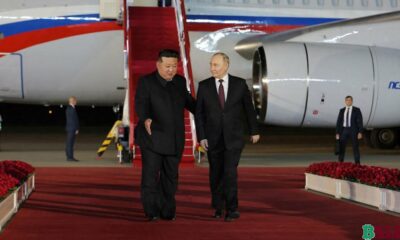World
Escalation of Drone Attacks on Moscow Amid Ukraine’s Offensive
Explore the rising frequency of drone attacks on Moscow as Ukraine intensifies its offensive. Understand the implications for regional security and the evolving dynamics of the conflict in this detailed analysis.

Escalation in Drone Attacks: Moscow Under Siege
On Wednesday, Russian officials reported a significant drone assault on Moscow that occurred overnight, coinciding with Ukraine’s ongoing cross-border offensive that has sent shockwaves through the Kremlin. Mayor Sergey Sobyanin of Moscow stated that the city’s air defense systems successfully intercepted and destroyed ten Ukrainian attack drones. Fortunately, no damages or casualties were reported in the capital.
In a social media statement, Sobyanin described the incident as “one of the largest ever attempts to attack Moscow with drones.” Drone strikes on the city, located over 270 miles from the Ukrainian border, are relatively infrequent. Such events disrupt the illusion of normalcy that has largely characterized life in Moscow, a city that has remained somewhat insulated from the broader impacts of the war, including Ukraine’s recent military actions in Russia’s western Kursk region.
In the past year, Russia has accused Ukraine of conducting drone strikes targeting significant government sites, including the Kremlin itself and other key government ministry buildings. On the same night, Russian authorities claimed to have shot down a total of 45 Ukrainian drones over its territory, while Ukraine asserted that it intercepted 50 Russian drones targeting its own airspace. However, neither of these claims has been independently verified, and the Ukrainian military has not provided comments regarding the reported drone attack on Moscow.
The ongoing dual drone assaults, occurring far from the front lines, have become a distinctive characteristic of the war in Ukraine. Both nations have increasingly targeted each other’s military installations and energy infrastructure. Notably, Russia has intensified its aerial bombardments on Ukrainian civilian areas, employing a mix of missiles and attack drones.
The Ukrainian cross-border offensive in the Kursk region marks the most significant foreign incursion into Russian territory since World War II, bringing the conflict to Russia in an unprecedented manner. This offensive has resulted in the evacuation of over 120,000 civilians from their towns and villages, compelling the Kremlin to urgently deploy reinforcements to counter the advancing Ukrainian forces.
The Institute for the Study of War, a Washington-based think tank, reported on Tuesday that Ukrainian forces continue to make incremental gains in the Kursk region. Geolocated footage from the battlefield indicates that Ukrainian troops have penetrated the outskirts of Korenevo, a small town with a population of approximately 5,000, and have pushed into two additional villages.
Furthermore, the Institute noted that the Ukrainian army is actively targeting pontoons that Russian forces are attempting to install across a section of the Seym River in the Kursk region. This follows the destruction or damage of three bridges in the area due to Ukrainian strikes. These operations appear designed to disrupt supply routes for Russian troops defending the territory caught between the river and the Ukrainian border.
Ukrainian officials, including President Volodymyr Zelensky, have repeatedly emphasized that one effective strategy to compel the Kremlin to engage in genuine peace negotiations is to make Russia experience the tangible impacts of the conflict, including by extending the battle into Russian territory.
Contributors: Kim Barker
World
Dominique Pelicot Testifies in Harrowing Rape Trial
Join us as Dominique Pelicot courageously testifies in a harrowing rape trial, shedding light on the complexities of trauma and justice. Her powerful story raises crucial questions about the legal system and the importance of support for survivors.

Dominique Pelicot Takes the Stand in Shocking Rape Trial
In a courtroom drama that has captivated France and garnered international attention, Dominique Pelicot, the man at the center of a harrowing rape trial, finally addressed the court. With tears streaming down his face, he recounted how his wife had been instrumental in helping him cope with a tumultuous past marked by trauma. He revealed that he had endured a sexual assault at the tender age of nine while hospitalized, and he also witnessed a gang rape during his teenage years while working as an apprentice electrician on a construction site.
“She didn’t deserve this, I acknowledge that,” Mr. Pelicot stated, his voice barely audible as he struggled to convey his emotions. The gravity of the situation weighed heavily on him, and the courtroom fell silent, straining to catch his every word.
Now 71 years old, Mr. Pelicot faces serious allegations of drugging his wife, Gisèle Pelicot, whom he has been married to for half a century, over a span of nearly ten years. Prosecutors contend that he used drugs to render her comatose, allowing him to rape her repeatedly. Furthermore, authorities allege that he went so far as to invite numerous men into their home, facilitating a nightmarish scenario where they, too, engaged in the assault of his wife.
Overall, 51 men, including Mr. Pelicot, are on trial concurrently, primarily facing charges related to the aggravated rape of Ms. Pelicot. Among them, one individual has already pleaded guilty to similar crimes, admitting to drugging his own wife to assault her and inviting Mr. Pelicot to partake in the horrific act while she was incapacitated.
Mr. Pelicot’s unexpected testimony came after a tumultuous start to the trial. Just a week in, he was stricken with severe health issues that forced him to miss four consecutive days in court. The head judge ultimately decided to postpone proceedings, as Mr. Pelicot was diagnosed with kidney stones, a kidney infection, and prostate complications, adding yet another layer of complexity to this already harrowing case.
World
Meta Bans Russian State Media Outlets from Social Media Platforms
Explore the implications of Meta’s decision to ban Russian state media outlets from its social media platforms. Understand the impact on information dissemination and the ongoing battle against misinformation in the digital landscape.

Meta Imposes Global Ban on Russian State Media Outlets
In a significant move, Meta Platforms, Inc., the parent company of Facebook, has announced the prohibition of Russian state media outlets, including RT (Russia Today) and Rossiya Segodnya, from all its social media platforms. The decision stems from the company’s concerns regarding the deceptive strategies employed by these media organizations to execute covert influence operations across the internet.
Meta made this announcement on Monday, emphasizing that the ban will be enforced worldwide across its various platforms, such as Instagram, WhatsApp, and Threads. The rollout of this ban is expected to take place over the coming days.
Statement from Meta
A spokesperson for Meta elaborated on the decision, stating, “After careful consideration, we have expanded our ongoing enforcement actions against Russian state media outlets. As a result, Rossiya Segodnya, RT, and other affiliated entities are now banned from our applications globally due to their involvement in foreign interference activities.”
For further insights into this development, watch the video in the player above.
World
Trump Recalls Alleged Assassination Attempt While Golfing
Explore Donald Trump’s chilling recollection of an alleged assassination attempt he experienced while enjoying a round of golf. Delve into the tense moments and his reflections on safety, fame, and the unpredictability of public life.

In a recent interview on the social media platform X, Republican presidential nominee Donald Trump recounted a harrowing incident he claims to have experienced while playing golf. Trump described how, during a peaceful Sunday morning round with friends, the tranquility of the day was abruptly shattered by the sound of gunfire in the air.
“It was a beautiful day, everything was just perfect,” Trump reflected. “Then all of a sudden, we heard shots being fired—probably around four or five in total.” He went on to explain that a Secret Service agent was the first to spot the suspect, who was allegedly armed with an AK-47, a powerful assault rifle.
“The agent saw the barrel of the weapon and immediately took action, returning fire at the barrel and aiming in the direction of the bushes,” Trump detailed. “I would have loved to have sunk that last putt, but we decided it was best to leave the scene promptly.”
Trump expressed his gratitude towards the agents and a vigilant civilian who aided in tracking down the suspect, who was eventually apprehended following a high-speed chase.
Suspect Faces Multiple Federal Gun Charges
The FBI has identified the suspect as Ryan Wesley Routh, accusing him of targeting Trump during his time at the golf club in West Palm Beach, Florida. According to an FBI report, Routh had allegedly hidden among the hedges of the golf course for an astonishing 12 hours. Authorities discovered an SKS-style assault rifle, a GoPro camera, and a bag of food at the scene.
The 58-year-old Routh is now facing two serious federal gun charges. If convicted on both counts, he could face a combined maximum sentence of 20 years in prison. Notably, neither of the charges is directly related to an assassination attempt. The first charge pertains to possessing a firearm despite a prior felony conviction, which carries a potential 15-year sentence, a fine of $250,000 (€225,000), and three years of supervised release.
The second charge involves possession of a firearm with an obliterated serial number, which could result in a five-year prison term, the same financial penalties, and also three years of supervised release. As the investigation continues, additional charges could be forthcoming.
While the motive behind Routh’s actions remains unclear, his digital footprint reveals strong political affiliations, particularly concerning issues surrounding Ukraine and China. Routh consistently expressed support for Ukraine across various social media platforms, even claiming to have orchestrated a recruitment scheme for international volunteers aiming to assist Ukraine in its fight against Russia’s invasion. This behavior has been denounced by Ukrainian soldiers and members of the International Legion, who disavowed Routh’s actions and motives.
-

 Business4 months ago
Business4 months agoObituary: Dan Collins
-

 Business3 months ago
Business3 months agoThe Significance of Jackson Hole: A Central Banking Tradition
-

 Gaming5 months ago
Gaming5 months agoMore than a thousand students vowed not to work for Amazon and Google due to the Nimbus Project.
-

 World5 months ago
World5 months agoRussia and North Korea Strengthen Defense Ties
-

 Business5 months ago
Business5 months agoJump Crypto Invests $10 Million in Pro-Crypto PAC
-

 Article5 months ago
Article5 months agoCreative Design Applications Developed with Artificial Intelligence
-

 Tech2 months ago
Tech2 months agoNew Leaks and Features About the Samsung Galaxy S25 Ultra
-

 Gaming5 months ago
Gaming5 months agoThe Inspirational Success Story of Avon’s Founder Who Sold Books Door to Door














